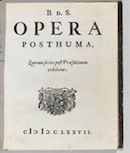
Selection from –Political Treatise - Chapter IV, of the functions of supreme authorities. (Page 1)
Spinoza's Words – (on affairs of state)
 That the right of the supreme authorities is limited by their power, we showed in the last chapter, and saw that the most important part of that right is, that they are, as it were, the mind of the dominion, whereby all ought to be guided; and accordingly, that such authorities alone have the right of deciding what is good, evil, equitable, or iniquitous, that is, what must be done or left undone by the subjects severally or collectively.
That the right of the supreme authorities is limited by their power, we showed in the last chapter, and saw that the most important part of that right is, that they are, as it were, the mind of the dominion, whereby all ought to be guided; and accordingly, that such authorities alone have the right of deciding what is good, evil, equitable, or iniquitous, that is, what must be done or left undone by the subjects severally or collectively.
And, accordingly, we saw that they have the sole right of laying down laws, and of interpreting the same, whenever their meaning is disputed, and of deciding whether a given case is in conformity with or violation of the law and, lastly, of waging war, and of drawing up and offering propositions for peace, or of accepting such when offered.
As all these functions are matters which regard the whole body of the dominion, that is, are affairs of state, it follows, that affairs of state depend on the direction of him only, who holds supreme dominion. And hence it follows, that it is the right of the supreme authority alone to judge the deeds of every individual, and demand of him an account of the same; to punish criminals, and decide questions of law between citizens, or appoint jurists acquainted with the existing laws, to administer these matters on its behalf; and, further, to use and order all means to war and peace and, finally, to levy the costs of all this.